-
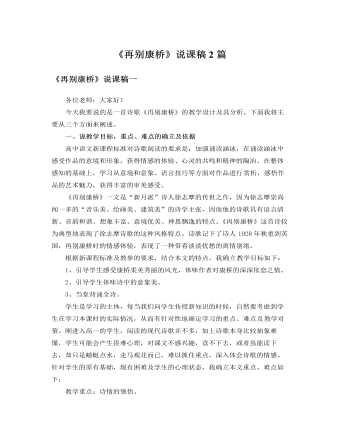
人教版高中语文必修1《再别康桥》说课稿2篇
一、教材分析1、教学对象分析《再别康桥》的教学对象是高一学生,高一学生往往对那种纯粹的、原始的、本真的情感体会较为肤浅,《再别康桥》是新月派诗人徐志摩的传世之作,有极高美学价值,它所抒发的离愁别绪是人类共同的情感经历,通过诵读容易将学生带人诗境,唤醒他们沉寂的真情,从而引起强烈的共鸣。 2、教材地位及作用 高中语文第一册第一单元为诗歌单元,本单元收录了中国现当代的一些优秀诗篇。《再别康桥》安排在本单元的第二课,属于必读课。虽然本诗向来众说纷纭,但其艺术之美人所共知,培养学生高尚的审美情趣和良好的审美创造力是语文学科的任务,因此,从语言赏析入手,从情感体验切入,就可以让学生通过学习本课体会现代诗歌的特点,多方面感受体悟诗歌的情感,受到美的熏陶。
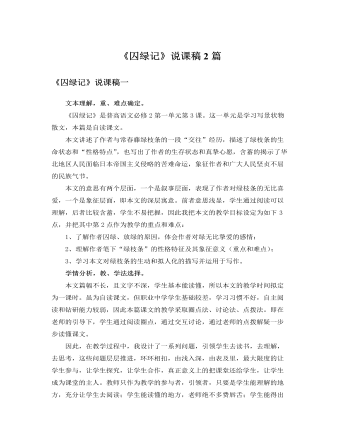
人教版高中语文必修2《囚绿记》说课稿2篇
“深入探究,把握主旨”这一步则是解决教学的重点难点,这里涉及到课文的深层意蕴,学生理解有难度,教师在通过问题引领学生探讨的基础上,还要适时启发、点拨,因为教学时间有限,让学生漫无边际的讨论,可能难以完成预定的教学任务,会使教学过程不完整。至于本文的写作特点的教学视时间而定,有时间可以让学生说一说,没有时间用小黑板出示一下,让学生了解就行,如果时间不够,甚至可以不讲。第三阶段是“延伸练习,巩固提高”。
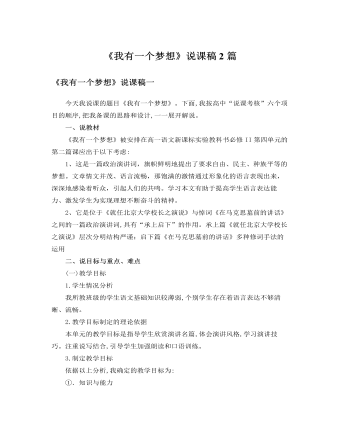
人教版高中语文必修2《我有一个梦想》说课稿2篇
(2).教学手段为了使我根据教材而设计的三个教学目标以及重点难点得以的突出和突破,达到最大化的展示境界,同时也为了配合以上我选择的四种教法得以完满实现,我决定采用“多媒体”教学手段进行全程教学。利用电脑的信息容量大,操作简便等优点,形象生动的直观展示教学内容,不但提高学习效率和质量,而且容易激发学生的学习兴趣和调动学习的积极性。四、说学法我为学生设计了三个学习方法:1.让学生学会在探究中学。通过“对黑人严酷处境的探究”和对文中重点语句的探究,培养学生在探究中学习的能力。2.让学生学会在读中学。通过“诵读法”指导学生在诵读过程中感受演讲词内在的魅力,学会在读中学。3.让学生学会在练习中学。通过“课外延伸练习法”,对所学的知识进行运用,培养学生的创新和自学能力。
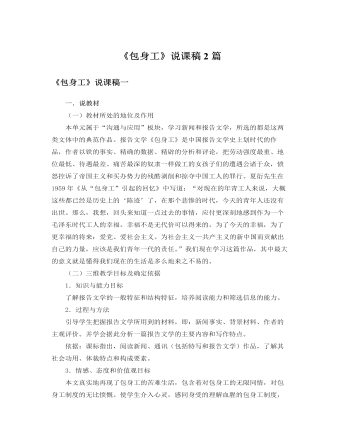
人教版高中语文必修1《包身工》说课稿2篇
(一)解题:包身工──旧社会一种变相的贩卖奴隶的形式。被贩卖的多是女孩子由承办人送到工厂做工,无人身自由,所得工资全部归承办人所有,在这种形式下做工的人也称包身工。包身工是指二三十年代(时间),在上海东洋纱厂里(地点),为外国人工作的女工(工作性质)。因为这些女工在进厂时已经签订了卖身契,失去了人身的自由权,所以被称为“包身工”。标题中的“包身”二字,突出了帝国主义、封建势力对中国女童工的残酷剥削的罪行,控诉了他们的野蛮残暴的统治手段,以激起人们的义愤和同情,这是全文的中心思想。(二)关于报告文学:《包身工》属于报告文学。(同类题材有初中的《地质之光》、《谁是最可爱的人》)报告文学,是文学体裁的一种,散文的一类,是文艺通讯、速写、特写的总称,是文学创作中的“轻骑兵”。
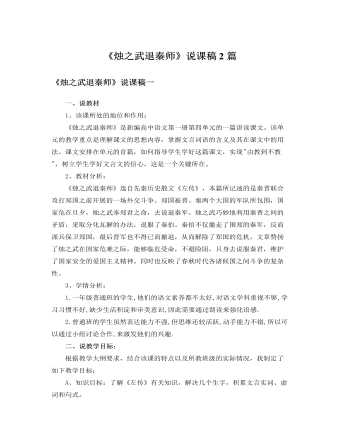
人教版高中语文必修1《烛之武退秦师》说课稿2篇
4、本文的重点是说辞,虽仅百余字,却委婉曲折,步步进逼,层层深入,表现出高超的劝说艺术、游说技巧。让学生细细品味并概括说辞中包含几层意思。第一层(“秦、晋围郑,郑既知亡矣”),分析形势,以退为进,博得好感。第二层(“若亡郑而有益于君”至“君之薄也”),亡郑陪邻,动摇联盟。第三层(“若舍郑以为东道主”至“君亦无所害”),存郑有益,利益引诱。第四层(“且君尝为晋君赐矣”至“唯君图之”),追溯历史,深入离间。可见烛之武面对大国的君主,巧舌如簧,不卑不亢,从容辞令,既不刺激对方也不失本国尊严,语言的分寸掌握得恰到好处。表现出烛之武机智善辩的外交才能。5、面对风云突变的局势,晋侯没有感情用事,而表现了清醒的头脑和理智的判断。这种隐忍不发、随机应变的胸怀和谋略,正是晋文公终成霸业的根本原因。设计意图:本环节的重点是全面把握烛之武这一人物性格特征,以及退秦师过程中体现出的非凡的胆识以及高超的谋略和语言艺术。
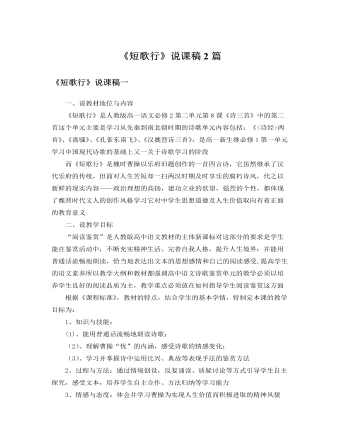
人教版高中语文必修2《短歌行》说课稿2篇
一、说教材《短歌行》是普通高中课程标准实验教科书必修(二)第二单元的一篇略读课文,本单元安排的是先秦到南北朝时期的诗歌。《短歌行》是著名政治家、军事家、文学家曹操的作品。诗中抓住“忧”字来写诗人为什么“忧”,如何解“忧”,从而表达希望能够招揽人才、完成统一天下的雄心壮志。所以本单元安排《短歌行》一诗,对学生全面了解曹操,感受曹操在短暂的人生中竭力创造伟业的气概。二、说学生我这一课的教学对象是高一学生。他们进入高中学习的时间只有三个多月,现在已经完成了必修(一)的学习。学习了现代诗歌单元,有了一定的诗歌学习基础,初步掌握了读诗的基本方法,但是还未能形成成熟的稳定的学习方式。同时,本单元学习是高中第一次接触古代诗歌,诗歌语言上的障碍和时间上的跨度对他们来说都是学习上的困难。因此教师要引导学生自主学习,合作学习,为他们设置新的学习情境,提供合作探究的机会。

新人教版高中英语必修3Unit 5 The Value of Money- Discovering Useful Structure教学设计
Step 3 Meaning1. 过去将来时表示从过去某一时间来看将要发生的动作或存在的状态, 常用在宾语从句中。一般由“would/should +动词原形”构成。She hoped that they would meet again someday. 她希望将来有一天他们能再见面。2. was/were going to+动词原形: 表示过去将要发生或很有可能发生的动作, 常用于口语中, 表示预言、意图或者打算等。He was going to start work the following week. 他打算下星期开始工作。3. was/were about to do: 常用来表示即将发生的动作, “刚要/正要做……”。注意该结构不与任何时间状语连用。I felt that something terrible was about to happen. 我感到某种可怕的事情即将发生。4.was/were to do: 表示“曾计划做某事”, 如果表示“本来计划做某事, 动作没实现”, 则需用 “was/were to have done”。She said she was to have told me about the accident. 她说她本来想告诉我关于事故的事。5.Start, go, come, leave, see, meet等动词的过去进行时: 表示就过去某一时刻而言即将发生的动作。She was coming later. 她随后就来。I had just put on my overcoat and was leaving to visit a friend of mine. 我刚穿上外套要去看我的一个朋友。

新人教版高中英语必修3Unit 5 The Value of Money-Listening &Speaking&Talking教学设计
4. A:We’d like to have someone to say a word at the beginning to welcome the group.B:↙Who?A:We thought that you or Dr.Johnson might do it.B用降调说Who,其意思是问,对方想让谁在开场时致欢迎词。Step 6 Pronunciation---Practice1. Listen to the short conversation and mark the intonation with ↗, ↙ or ↙, ↗. Then discuss with a partner what they intend to convey by using different intonation.Owner: You know what ?↗ It’s a million-pound bank note↙.Waiter 1: Really ?↗(question)Waiter 2: Really !↙(unbelievable and surprised)Waiter 3: Really ?!↙↗(first question then surprised)2. Listen to the conversations. Underline the parts that are stressed and mark the intonation. Then talk about the implied meanings of the responses with different intonations. Listen again and repeat.1) Henry: It’s a nice suit.Owner: Oh, it’s perfect!↙(The intonation means it is very suitable for Henry.)2) Henry: Well, that’s very kind of you.Owner: Kind, sir ?↗(what you said is not right) No, it’s kind of you. You must come whenever you want and have whatever you like. Just having you sit here is a great honour !!↙(welcome you to come again)3)Henry:Well, to be honest, I have none. Oliver:(happily) What luck!(excited) Brother↗, what luck!↙(It means “Didn’t you hear it?”)Henry: Well, it may seem lucky to you but not to me!↗(angry) If this is your idea of some kind of joke, I don’t think it’s very funny. Now if you’ll excuse me, I ought to be on my way.↙(If so, I would leave.)Roderick: Please don’t go↙...(hope Henry can wait for a moment)Part B Viewing and Talking---Describe people’s changing attitudes in a film clipStep 1 Before-listening---Tell the filmYou are going to watch part of the film The Million Pound Bank Note. Look at these photos and guess what happens in the film.

新人教版高中英语必修3Unit 5 The Value of Money-Listening &Speaking教学设计
Step 4: Listen again and decide if the following statements are true (T) or false (F).1 It was the first time Chen Liyan's story was reported. T口 F口2 Chen found 10,000 yuan in a small plastic bag in Taiyuan railway station口 F口3 Wang Zheng apologized to Chen because he couldn't offer her more money. T口 F口4 Chen took out a large loan to cure her daughter, T口 F口5 Wang set up a fundraising website for Chen's daughter after Chen told him about her situation. T口 F口Step 5:After listening, discuss the questions.1 What kind of person do you think Chen Liyan is?Chen Liyan is generous and honest because she returned a large sum of money to the owner.2 Did Chen return the money because she didn't need it?No. She returned the money because it was the right thing to do. Evidence for this is that she refused to accept the reward money because she felt that it had not been earned. 3 Is it common for people to do what Chen did?It depends on the culture. In some countries it is quite common to return money that has been found. In other countries, people believe "Finders are keepers!" 4 How did Wang Zheng feel about the return of his money?He must have been very happy and relieved to have gotten his money back. We know this because he thanked Chen repeatedly and even offered her a reward.5 Why did Ma Dongbao tell Wang about Chen's family?He must have had great sympathy for Chen and her daughter and wanted to help them.'We know this because he arranged help for them. 6 How did the news reporter feel about Chen's actions?The news reporter felt that it showed that money wasn't the most important thing in life. We know this because the reporter told us that this is what Chen believes. and then said, “that's a great attitude to take."

新人教版高中英语必修3Unit 5 The value of money-Reading and Thinking教学设计二
? Could you offer me some kind of work here?? I don’t want your charity, I just want an honest job.? Careless: I landed in Britain by accident.Step 7:Consolidation.? Find Henry? Roderick and Oliver were I .making a bet when they saw Henry, a poor young man. ? Know Henry? About a month ago, Henry was sailing and later he found himself carried out to sea by a strong wind. Fortunately, he 2.was spotted by a ship. And it was the ship that brought him to 3.England? Offer money to Henry ? Oliver and Roderick gave Henry a letter and told him that there was money in it. They 4.persuaded him to accept it, and made him 5.promise that it wouldn't be opened until 2 o'clock.Step 8:Language pointsa large amount of: a large quantity of; a great deal ofe.g. They bought a large amount of furniture before they moved their new house.make a bet: make an arrangement to risk money, etc. on an event of which the result is doubtful.e.g. We made a bet on the result of the match.permit sb to do something: allow somebody to do somethinge.g. My mother doesn’t permit me to ride in the street after it rained.by accident: as a result of chancee.g. I only found it by accident.stare at: look at somebody or something with the eyes wide open in a fixed gaze( in astonishment, wonder, fear, etc)to be honest: to tell you the truth; to be franke.g. To be honest, I don’t think we have a chance of winning.Step7 Homework:What do you think will happen to Henry? Will the bank-note help him or get him into trouble?

新人教版高中英语必修3Unit 5 The Value of Money-Reading and Thinking教学设计一
Everybody wants to get wealth.In today’s material world,making money or becoming wealthy symbolizes a person’s success and capability. Many people just make every effort, pay any price to attain greater wealth. With money,they can buy nice, large apartments in nice neighborhood. With money they can own luxurious cars. Wealth seems to bring all happiness in life.But is wealth the only road to happiness? Not really. There are many things in the world, which are beyond the means of money, such as friendship, love, health and knowledge. People are so preoccupied with struggling for money that they have no time or would not take the time to form or maintain friendship. What happiness can they feel living as lonely miserable creatures without love or friends in the world even if they accumulate tremendous wealth?In my opinion, people can’t do anything without money, but money is not everything. What money will bring you depends on your personal belief and goal in life. If you are kind enough to help others, especially the poor, money is a good thing to you. With it, you can do much more for the benefit of people and your country, and it will add to your own happiness. If you want money just for your own needs, you’ll never be satisfied or happy. In a word,you should have money spent for more people. Only then can money be the source of your happiness.Step 8 Homework4 students in a group, one acts Roderick, one Oliver, one servant and the fourth one acts Henry Adams, then listen to the tape, pay more attention to the difference between American English and British English in pronunciation, stress, tone.

新人教版高中英语必修3Unit 5 The Value of Money-Reading for Writing教学设计二
2. 您能看到, 我头发太长了。You can see that my hair is much too long.3. 无论什么时候, 只要您想回来就回来。Please come back whenever you want.4. 您仅有很少的头发要理! You only have too little hair to cut !5. 为您服务是我的荣幸!It is my honour to serve you!Step 9 Writing(Henry is walking down the street when he sees a sign for a place that cuts hair. He decides to have it cut. )H=Henry B=BarberH: Good afternoon, I’d like to have my hair cut, if I may. (The barber looks at Henry’s hair and continues cutting another man’s hair. ) Er, I’d really like a haircut. As you can see it’s much too long. B: (in a rude manner) Yes, I can see that. Indeed, I can. H: Fine, well, I’ll have a seat then. (He sits in one of the barber’s chairs. The barber turns to look at Henry. )B: It’s quite expensive here, you know! Are you sure you can afford it?H: Yes. I think so. (After his hair is cut, the barber tells Henry how much he must pay. Henry shows the barber the bank note. )B: Why Mr. . . (looks shocked)H: Adams. Henry Adams. I’m sorry. I don’t have any change. B: Please don’t worry! (wearing a big smile) Nothing to worry about! Nothing at all! Please come back whenever you want, even if you only have too little hair to cut! It will be my honour to serve you!Step 10 Pair workExchange drafts with a partner. Use this checklist to help your partner revise his/her draft.1. Are all the elements of a play included and in good order ?2. Do the character use suitable language ?3. Are the stage directions clear and useful ?4. Is the plot clear and exciting enough ?

新人教版高中英语必修3Unit 5 the value of money-Reading For Writing教学设计一
【参考范文】Narrator:(Henry is smiling as he leaves the restaurant. As he is walking down the street, he sees a sign for a place that cuts hair. He decides to get it cut. )H=Henry;B=Barber;R=rude manH:Good afternoon, I'd like to get a cut, if I may. (The barber looks at Henry's hair and continues cutting another man's hair. )Er, I'd really like a haircut. As you can see it's much too long. B:(in a rude manner) Yes, I can see that. Indeed, I can. H:Fine, well I'll have a seat then. (He sits in one of the barber's chairs. The barber turns to look at Henry. )B:It's quite expensive here, you know!Are you sure you can afford it?H:Yes. I think so. (In comes the rude man. )R:Hey you there. I need a haircut quickly. Can you do me straightaway?B:All right, then, get in the chair and I'll see what I can do. R:Thank you. (sits down in one of the barber's chairs)H:Excuse me, but I was here first. Aren't you going to do my hair first?B:This man's in a hurry. H:Well so am I!I insist that you cut my hair first. B:OK, but I'll have to be quick. This gentleman is waiting. H:Thank you. (They both become quiet. After his hair is cut, the barber tells Henry how much he must pay. Henry shows the barber the bank note. )B:Why, Mr . . . (looks shocked)H:Adams. Henry Adams. I'm sorry, I don't have any change. R:You're that Mr Adams! Well,I'm glad I waited or I might never have known it was you. B:Why, Mr Adams, please don't worry!(wearing a big smile) Nothing to worry about!Nothing at all!Please come back any time, even if you only need too little hairs cut!It will be my honour to serve you!

新人教版高中英语必修3Unit 5 The Value of Money-Discovering Useful Structures导学案
4.They were going to find someone to take part in their bet when they saw Henry walking on the street outside.[归纳]1.过去将来时的基本构成和用法过去将来时由“would+动词原形”构成,主要表示从过去某一时间来看将要发生的动作(尤其用于宾语从句中),还可以表示过去的动作习惯或倾向。Jeff knew he would be tired the next day.He promised that he would not open the letter until 2 o'clock.She said that she wouldn't do that again.2.表示过去将来时的其他表达法(1)was/were going to+动词原形:该结构有两个主要用法,一是表示过去的打算,二是表示在过去看来有迹象表明将要发生某事。I thought it was going to rain.(2)was/were to+动词原形:主要表示过去按计划或安排要做的事情。She said she was to get married next month.(3)was/were about to+动词原形:表示在过去看来即将要发生的动作,由于本身已含有“即将”的意味,所以不再与表示具体的将来时间状语连用。I was about to go to bed when the phone rang.(4)was/were+现在分词:表示在过去看来即将发生的动作,通常可用于该结构中的动词是come,go,leave,arrive,begin,start,stop,close,open,die,join,borrow,buy等瞬间动词。Jack said he was leaving tomorrow.
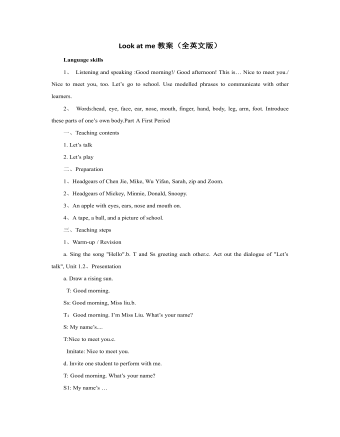
人教版新课标PEP小学英语三年级上册Look at me教案(全英文版)
3、Practicea. Nice to meet you. Nice to meet you,too.b. Perform the dialogue.c. Arrange the dialogue according to the pictures or sentence cards.d. Let’s play.A: Good afternoon,B. This is C. Hello, C! Nice to meet you.C: Nice to meet you, too.A,B: Goodbye!C: Bye!4、Assessment Workbook page 10Add-activitiesa. Listen to the recording and repeat.b. Make a dialogue according to "Let’s talk".Second Period一、Teaching contents1. Let’s learn Words:body, leg, arm, hand, finger, foot.1. Let’s do二、Preparation1、a puppet2、Cards of body, leg, arm, hand, finger and foot.3、headgear of a captain三、Teaching steps1、Warm-up/ Revisiona. Captain says to review "let’s do" of Part A.b. Perform the students their own dialogues.2、Presentationa. Learn to say "body, leg, arm, hand, finger and foot."b. Listen to the recording and repeat.c. Let’s do. Clap your hands. Snap your fingers. Wave your arms. Cross your legs. Shake your body. Stamp your foot.3、Practicea. Let’s draw a person.b. Let’s do. Point out which picture.c. Let’s do. Who responses faster.4、Assessment Workbook page 115、Add-activitiesa. Listen to the recording, repeat and act out.b. Say all the names of the body to your parents.Third Period一、Teaching contents1. Let’s check2. Let’s chant二、Preparation1、stationeries1、pictures of parts of Zoom
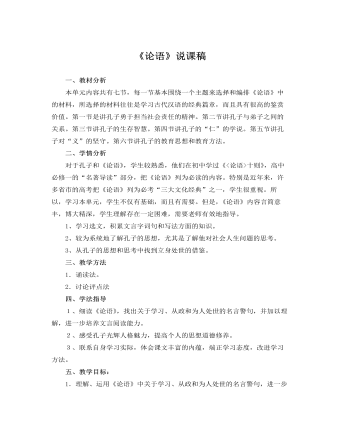
人教版高中语文必修1《论语》说课稿
三、文本中的句子解决完毕,大家对文本内容的理解更加深入了。请速度文本,思考:《论语》具体涉及了哪些方面的内容,体现了孔子什么观点?明确:主要有治学、从政、修身养性和交友治道等方面,体现了孔子“克己复礼”的思想。四、 教师引导学生讨论: 如何评价孔子的言行和观点?从古至今人们对孔子有哪些评价?明确:1、春秋战国时代, 孔子门人及其后学者均推尊孔子。门人中以子贡为代表,他对孔子赞美备至,奉如天人,把孔子比拟为高天、日月、木铎,凡人是永远不可企及的,认为孔子是天生的圣人,“仰之弥高,钻之弥坚”。亚圣孟子认为孔子所行的“圣人之道”是遍及自然界和社会的至高准则。然而当时民间一般看法认为孔子是博学成名的大学者。
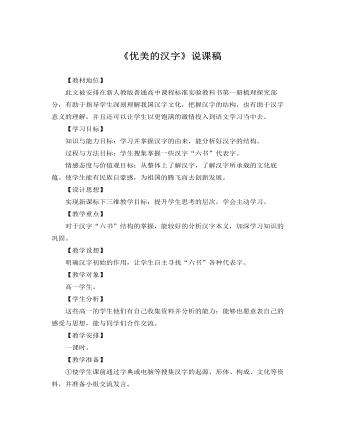
人教版高中语文必修1《优美的汉字》说课稿
明确:(1)结绳记事说。原始记事的一种方法。人类在没有发明文字或文字使用尚不普遍时,常用在绳索或类似物件上打结的方法记录数字,表达某种意思,用以传达信息,处理事件。 (2)书画说。(3)仓颉造字说。中国自古就有仓颉造字之说。文字的发明是人类发展史上一件石破天惊的大事,它将人们的思维、语言、经验以及复杂的社会现象记录下来,使文化得以传播交流、世代传承。2、汉字的形体:中华民族五千年的历史中,汉字的演变,从甲骨文--金文--大篆--小篆--隶书--草书--楷书--行书,字形由象形到点横竖撇捺的方块字,经历了漫长的岁月。其中凝聚着民族的智慧,也体现出汉字逐步完善的过程,凸显其方方正正、四平八稳的特点。汉字又是一种文化的体现,那些经过艺术处理的汉字或跳起了拉丁舞、有的如同酒醉的成龙打起了醉拳,更是让我们感到的是在欣赏汉字在纸张上跳舞,所以:书法是“纸上的舞蹈”。请大家看到书上的相关内容,注意每一种形体的汉字的载体是什么,其功能又有什么不一样。
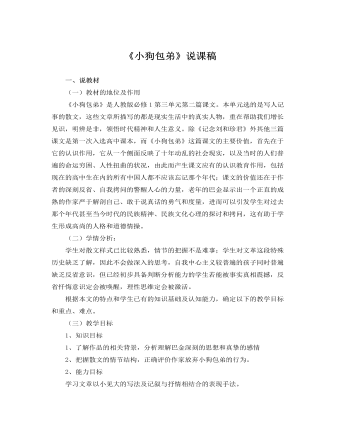
人教版高中语文必修1《小狗包弟》说课稿
探究、讨论、交流:1、包弟讨人喜欢,作者却不得不将它送走,为什么?2、送走包弟后,作者为什么先是感觉轻松,随后觉得沉重?3、“您的小狗怎样?”这句话反复出现,有什么用意?4、“整整十三年零五个月过去了”“整整”一词有什么作用?5、“满园的创伤使我的心仿佛又给放在油锅里熬煎”这句话如何理解?6、“我怀念包弟,我想向它表示歉意。”如何理解?学生各抒己见后教师结合材料发表看法明确总结特别是最后一个问题得出作者这发之心底的语言,不仅仅是歉意,更是发自灵魂深处的忏悔!是对生命的尊重,是一个有良知的作家对反省历史的呼号。第三环节“认识你自己”——忏悔意识与我引导学生正视和反省成长过程中曾犯下过错。并布置课后作业:要求学生课后在本周随笔中谈反省忏悔后的感受。
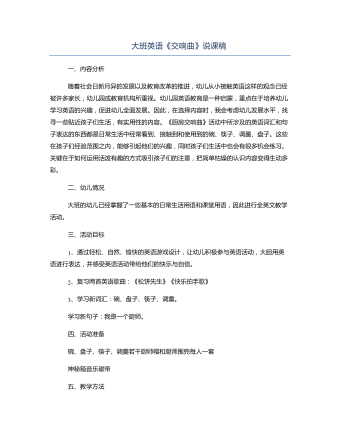
大班英语《交响曲》说课稿
二、幼儿情况大班的幼儿已经掌握了一些基本的日常生活用语和课堂用语,因此进行全英文教学活动。三、活动目标1、通过轻松、自然、愉快的英语游戏设计,让幼儿积极参与英语活动,大胆用英语进行表达,并感受英语活动带给他们的快乐与自信。2、复习两首英语歌曲:《松饼先生》《快乐拍手歌》3、学习新词汇:碗、盘子、筷子、调羹。学习新句子:我是一个厨师。四、活动准备碗、盘子、筷子、调羹若干厨师帽和厨师围兜每人一套神秘箱音乐磁带五、教学方法1、游戏法孩子生来是好动的,是以游戏为生命的。游戏化教学有着其他活动不能代替的功能和价值。英语与游戏的结合,能充分激起幼儿学英语的兴趣,密切师幼关系,尤其能提供给幼儿轻松自然愉快运用英语的机会。2、直接法全英文教学形式,直接培养幼儿简单英语思维以及表达习惯。3、重复法不断重复单词与句型,刺激幼儿印象,强化巩固记忆。4、赏识教育法鼓励与表扬幼儿的每一次进步,培养孩子们的兴趣,并帮助他们树立信心。六、活动过程1、问候

人教版高中语文必修3《林黛玉进贾府》教案2篇
2、黛玉进入贾府到贾母处,她看到了什么?提示:从荣府西角门进去,走“一射之地”,转至垂花门,过穿堂,绕插屏,再经三间过厅,后面方是贾母居住的正房大院。“正面五间上房,皆雕梁画栋,两边穿山游廊厢房,挂着各色鹦鹉、画眉等鸟雀。”这样穿堂过厅一路行来,仆役、婆子、丫环轮番更换,的确给人以侯门深似海的感觉。然而贾母居处还不是正内室。3、黛玉去拜见二舅舅时又看到什么?提示:往东。“穿过一个东西的穿堂,向南大厅之后,仪门内大院落,上面五间大正房,两边厢房鹿顶耳房钻山,四通八达,轩昂壮丽”。堂屋中迎面“一个赤金九龙青地大匾,匾上写着斗大的三个大字,是‘荣禧堂’,后有一行小字:‘某年月日,书赐荣国公贾源’,又有‘万几宸翰之宝’。”屋内摆设有名贵的家具,珍贵的字画、古玩。“又有一副对联,乃乌木联牌,镶着錾银的字迹,道是:座上珠讥昭日月,堂前黼黻焕烟霞。”由堂屋进入东耳房,这里是起居室,另有一番布置,再到东廊三间小正房王夫人的住室,又别有摆设。